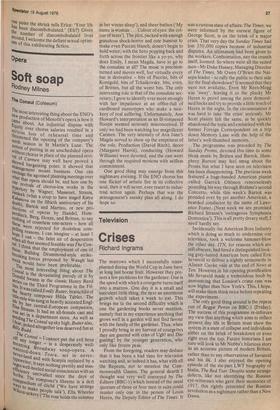Television
Crises
Richard Ingram
The marrows which I successfully transplanted during the World Cup in June have at long last borne fruit. However they present a few problems for the gardener. One is the speed with which a courgette turns itself into a marrow. One day it is a small and succulent little thing, the next an enormous growth which takes a week to eat. This brings me to the second difficulty which is one the gardening books never mention, namely that in my experience anything that grows well in a garden will not find favour with the family of the gardener. Thus, when I proudly bring in my harvest of courgettes they are greeted with cries of Ugh! and Disgusting! by the younger generation, who only like frozen peas.
From the foregoing, readers may deduce that it has been a bad time for television watching and, so indeed it has, what with all the Repeats, not to mention the Commonwealth Games. The general dearth I thought was very well conveyed by The Editors (BBC-1) which instead of the usual quorum of three or four men in suits could muster only one in the person of Louis Heren, the Deputy Editor of The Times. It was a curious state of affairs. The Times, we were informed by the earnest figure of George Scott, is on the brink of a major crisis. That very day the Sunday Times had lost 350,000 copies because of industrial disputes. An ultimatum had been given to the workers. Confrontation, nay the crunch itself, loomed. So where were all the suited men—Mr Duke Hussey, Managing Director of The Times, Mr Owen O'Brien the Natsopa leader to rally the public to their side for the final showdown? It seemed that they were not available. Even Mr Rees-Mogg was 'away', leaving it to the plucky Mr Heren to prowl among the poor demoralised hacks and try to provide a little touch of Heren in the night. In the circumstances it was hard to take 'the crisis' seriously. Mr Scott plainly felt the same, as he quickly abandoned the topic and embarked with the former Foreign Correspondent on a trip down Memory Lane with the help of the latter's well-thumbed memoirs..
The programme was preceded by The Sunday Proms, devoted this time to some bleak music by Britten and Bartok. Humphrey Burton may feel smug about the Proms but what I have seen on television has been disappointing. The previous week featured a huge-handed American pianist called Garrick Ohlsson remorselessly pounding his way through Brahms's second Concerto, while this week's Bartok was presided over by yet another American, a bearded conductor by the name of Lawrence Foster. (Next week we are promised Richard Strauss's 'outrageous Symphonia Domestica'). This is all pretty dreary stuff, I need hardly say.
Incidentally the American Bore Industry which is doing so much to undermine our television, took a welcome hammer-blow the other day. ITN, for reasons which are still obscure, had hired a distinguished looking grey-haired American bore called Eric Sevareid to deliver a nightly sermonette in Alistair Cooke vain at the end of News at Ten. However in his opening pontification Mr Sevareid made a tremendous boob by announcing that London's crime rate was now higher than New York's. This, I hope, will make them think twice before repeating the experiment.
The only good thing around is the repeat run of Reggie Perrin on BBC-1 (Friday). The success of this programme re-inforces my view that anything which aims to reflect present day life in Britain must show the system in a state of collapse and individuals either on the brink of breakdown or even right over the top. Future historians I am sure will look to Mr Nobbs's hilarious story as an accurate picture of modern Britain, rather than to any observations of Savareid and his ilk. I also enjoyed the opening episode of the six-part LWT biography of Stalin, The Red Tsar. Despite some strange defects, like not identifying the Russian eye-witnesses who gave their memories of 1917, this rightly presented the Russian revolution as a nightmare rather than a New Dawn.


































 Previous page
Previous page